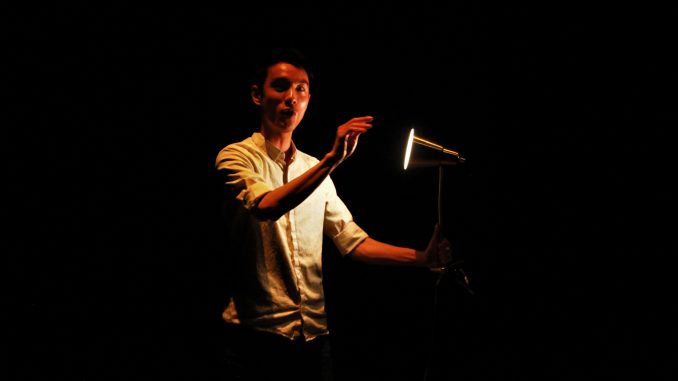
A story from Sarnia, the Aamjiwnaang First Nations reserve; one of Canada’s largest petrochemical corridors. The Chemical Valley Project follows the story of Vanessa and Beze Gray, a sibling duo from Sarnia who have embodied the roles of land defenders and water protectors by pouring all of their time and energy into protecting their community’s future, and fighting the threats of pollution. Written and performed by Kevin Matthew Wong and co-created and produced by Julia Howman, The Chemical Valley Project is a one-person theatrical play that outlines the story of Vanessa and Beze through the clever usage of projection, lighting, objects, videos, voice overs, and the power of quality storytelling.
“We’re using stage technology to literally amplify the voices of Vanessa and Beze,” Wong tells Arthur in a conversation. Taking the voice of a passionate storyteller, Wong uses the 70 minutes of the performance to mesmerize, interact with, and provide awareness to the audience members while maintaining refreshing wit and humor. In essence, The Chemical Valley Project is a telling of a story, more than it is your conventional theatrical play. There is an observable play on shadows that is very blatant throughout the play, and Kevin takes the fluidity of his actions to convey a story on a subject matter that is equally as sensitive as it is important.
Sitting in the audience and watching the story unfold makes one realize that perhaps the biggest strength of The Chemical Valley Project lies in its ability to take a story and narrate it with a delicacy that entirely avoids the appropriation of a culture. A culture in which neither Howman, who comes from a family of settlers, nor Wong as a first generation Canadian with parents who immigrated from Hong Kong, belong to. On being asked how he actively and consciously avoids that appropriation, Wong gives some good advice:
“A great motto to work by is nothing about us, without us,” he says. “You need somebody from the community that you’re working for to be on the team, to have consultation with you, otherwise there is no way to do it accurately and there is no way to do it in a full rich way without that real lived experience and otherwise, it’s just fiction and for us the goal is not that at all. It’s too real,” Wong emphasizes. “The intentionality has always been amplification rather than appropriation,” he finishes on a firm message.

Another major theme that the performance explores is guest culture, and what it means to be on a territory that doesn’t entirely belong to you. For this, Wong uses the metaphor of a wampum belt, which is a belt made from traditional wampum beads. “If we think about the Wampum belts, and the two boats moving in parallel, part of keeping it parallel is understanding the principles of the other boat. And we can’t do our part in upholding that parallel movement if we don’t understand: that is going to cause these two boats to collide.” For Wong, personal involvement and comfort of the siblings Vanessa and Beze in the process seem to be imperative, and a lot of Wong’s passion towards The Chemical Valley Project seems to sprout from his friendship with the siblings.
“At every stage of this project we’ve been ready to say that if it doesn’t work for Vanessa and Beze, if it doesn’t serve the intended purpose, we need to let it go,” Wong adds, “Consulting and being with people that are affected and are from that community is important. And so is knowing yourself, because you can’t be in a conversation with somebody if you don’t know where you’re coming from.” Kevin outlines. On being asked if he plans on taking any more stories of other young activists and bringing them on the stage, Wong once again emphasizes his friendship with Beze and Vanessa, and talks about the difficulty of building that kind of connection with everyone. He talks about wanting to have that connection and friendship before putting on a show about yet another cause. “We would never do a show, just to do a show,” he repeats time and again, on a serious note.
Self-proclaimed as a relaxed theatre experience, The Chemical Valley Project in conjunction with Public Energy Peterborough, redefined the conventional uptight, and often tense, theatre experience. The experience of watching the performance itself was made into an all-inclusive and accessible safe space for any and everyone seeking an understanding of Beze and Vanessa’s work. Some notable efforts made to accommodate everyone included two ASL interpreters signing throughout the performance, ASL interpretation at the box office, as well as pen and paper for those who prefer to communicate non-verbally. There was also hearing assistance with headsets, low cost tickets, and gender neutral washrooms, all while maintaining a low electromagnetic frequency and a scent-free environment. Another opportunity that was provided to all those who were willing to learn more about object focused storytelling and devised theatre, was the devised theatre workshop held a day after the showing of The Chemical Valley Project on March 7, 2020 at the theatre on King Street.
A mesmerizing three hours filled with stories, communication, and storytelling, the devised theatre workshop facilitated by Kevin himself saw strangers from various backgrounds come together to share stories and animate those stories using everyday objects in an entirely unconventional and innovative way. From energetic warm-up exercises to three activities that each revealed something new and different about the present individuals, the devised theatre workshop was definitely perceived as a safe space by all the attendees. This led to greater comfort and creative freedom, and at the end of the day, essentially led to well-developed, creative, well-narrated stories that resonated with everyone in the room. The workshop ended on a very sweet note of gratitude and happiness, with everyone attending leaving the space feeling a little more included, grateful, and happy.

